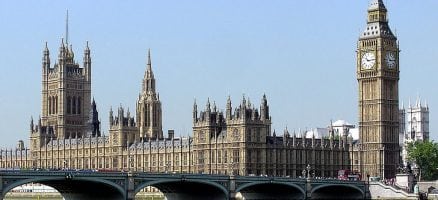At national and international forums, current government has been vibrant in promising implementation the CHT Accord, but it is unfortunate that their promises have not been translated into action yet. PCJSS and civil society of the country have been continuing dialogues with the government to advance implementation process of the Accord, but no remarkable development has been achieved yet.
PCJSS representative Mangal Kumar Chakma said this statement at a seminar on Bangladesh titled “Economic Development and Role of Political Parties” held on 19 July 2016 in the House of Commons in London, United Kingdom. The seminar was presided over by Lord Carlile and Anne Main, Member of the House of Commons and Chairperson of All Party Parliamentary Group on Bangladesh. Mangal Kumar Chakma, Information and Publicity Secretary of PCJSS, was present as one of the speakers in the seminar. Besides, H T Imam, Minister and Political Advisor to Prime Minister Sheikh Hasina; Dr. Moshiur Rahman, Economic Advisor to Prime Minister Sheikh Hasina; Ms. Tarana Halim, MP & State Minister for Telecommunication; Mr. Narayan Chanda, MP & State Minister for Fisheries and Livestock from Awami League; and Dr. Anisul Islam Mahmud, Minister of Water Resources and Presidium member of Jatiyo Party and Mr. Amir Khasru Mahmud Choudhury, Advisor to Begum Khaleda Zia; and Mr. Sabi Uddin Ahmed, Foreign Affairs Advisor to Begum Khaleda Zia from BNP were, among others, present as speaker in the seminar.
The seminar was held under the strict rules and regulations of UK Parliament. The seminar was started with keeping few second silence in memory of Lord Avebury who died in February 2016. Around 60 representatives from Awami League, BNP and Jatiyo Party, representatives of ethnic and religious minorities, human rights activists, academicians, representatives of British foreign ministry attended the seminar.
On behalf of PCJSS, Mangal Kumar Chakma said that economic and social development is one the of crucial provisions of Chittagong Hill Tracts (CHT) Accord signed in 1997 between the Government of Bangladesh and PCJSS, political party of indigenous Jumma peoples and the issue is also inseparably linked to the rights to free, prior and informed consent which is stipulated in the CHT Accord and many international instruments. Development with culture and identity is characterized by a holistic approach that seeks to build on indigenous peoples’ collective rights, security and greater control and self-governance of lands, territories and resources.
As per the CHT Accord, the CHT Regional Council (CHTRC), the apex body in the CHT special administrative system, has the power relating to general administration, law and order, and to undertake supervision and coordination of all development activities including three Hill District Councils (HDCs) and the CHT Development Board. But the government, inter alia, the HDCs and Development Board have been carrying out its development activities in the CHT bypassing the CHT Regional Council.
The Government has taken a range of important decisions relating to general administration, law & order, and development, without proper consultation with the CHTRC and HDCs. In forming new administrative units – Guimara Upazila in Khagrachari district, Sajek police station and Bartholi Union in Rangamati district, for example, the government did not consult with the CHTRC and the concerned HDC. The government has been taking decisions and implementing development programmes, which have negative impacts on culture and identity of Jumma people, such as, construction of border roads, land port at Thegamukh, setting up of luxurious tourism complexes by the military authority, declaration of reserved forests, installation of Border Out Posts (BOP) for Border Guard Bangladesh (BGB), without consulting the CHTRC and the three HDCs. It is noteworthy that though PCJSS has been the signatory of the CHT Accord but it has been seldom consulted for any economic development in CHT. Even during the preparation of budget for the Ministry of CHT Affairs (MoCHTA) under National Budget, CHT political parties never been consulted. It is also the same for local development budget prepared by the HDCs and CHT Development Board.
The top-down approach to development is still being followed in the CHT, despite the establishment of the CHTRC and three HDCs to decide on their own development needs by themselves. As a result, the trend of self-determined development, as per the CHT Accord, is yet to be ensured in the CHT. This top-down approach are severely jeopardising the characteristic of tribal-inhabited region of CHT, which is recognised and guaranteed by the CHT Accord. Moreover, the government did not take any initiative to holding elections of three HDCs and CHTRC since the signing of the Accord which leads to deprivation of the CHT people from their rights to choose their representatives. So, active participation and role of local political parties has been denied in the development sector. In addition, the crucial subjects, among others, general administration, law and order, police, land and land management, forest, environment, are yet to be transferred to these CHT institutions. So, development works being carried out in CHT could be meaningless if the people concerned do not have rights to self-governance and decision, and if these developments lead to adverse impacts upon the culture and livelihood of Jumma people.
Non-functionality of the CHT Land Commission, even after 19 years of the Accord, is the main reason of land related conflicts in CHT. Although the Government repeatedly assured the UN Human Rights Council during Universal Periodic Review (UPR) session in 2009 and 2013, United Nations Permanent Forum on Indigenous Issues (UNPFII), to take all possible steps to amend the contradictory provisions of the CHT Land Dispute Resolution Commission Act 2001, however it is still to deliver its potentials. A 13-point amendment proposals to this Act was agreed by the government and PCJSS twice in 2011 & 2015, but it is yet to be adopted in the parliament. Most of the human rights violations concerning indigenous peoples are closely interlinked with ownership, occupation and access to land, including those used in accordance with customary law. After signing the Accord, more than 30 villages in Bandarban district alone were abandoned by the Jumma villagers due to continuous land grabbing and harassment. Despite recognition of preservation of CHT as tribal-inhabited area in the Accord, fresh political migration of Bengali Muslims from different districts of the country to the CHT continues alarmingly.
The government is providing misleading information saying that the majority portions of the Accord (48 provisions out of 72 provisions) have been implemented. However, in fact, only one-third provisions of the Accord (25 provisions out of the 72) have been implemented. It means that two-third provisions of the Accord including its critical provisions are lying unimplemented as of this day. PCJSS and civil society have been continuing dialogues with the government to advance implementation process of the Accord, but no remarkable development has been achieved yet. At national and international forums, current government has been vibrant in promising implementation the Accord, but it is unfortunate that to the date, their promises have not been translated into action yet.
Mr. Chakma urged all development partners including UK government and political parties in Bangladesh to play strong roles for proper, speedy and fullest implementation of CHT Accord, pertaining to immediate resolution of land dispute by amending the said Land Commission Act of 2011, devolution of political & administrative powers to CHT institutions.
Besides, Members of UK Parliaments, human rights activists, academic and minority rights activists including Mr. Brad Adams, South Asia Director, Human Rights Watch; Mr. Abbas Faiz, Political Analyst of South Asia; Dr. Brian Sommerfiled, Director of Cleft Bangladesh et al spoke in the seminar. They raised the issues of killing, forced disappearance, lack of freedom of speech and association, atrocities upon minorities and indigenous peoples, alarming militant activities, government capacity to combat militant groups, and overall human rights situation in Bangladesh. On the other, ruling party representatives highlighted economic development and growth, governance and rule of law, drastic action against human rights violations and militant activities, etc.


